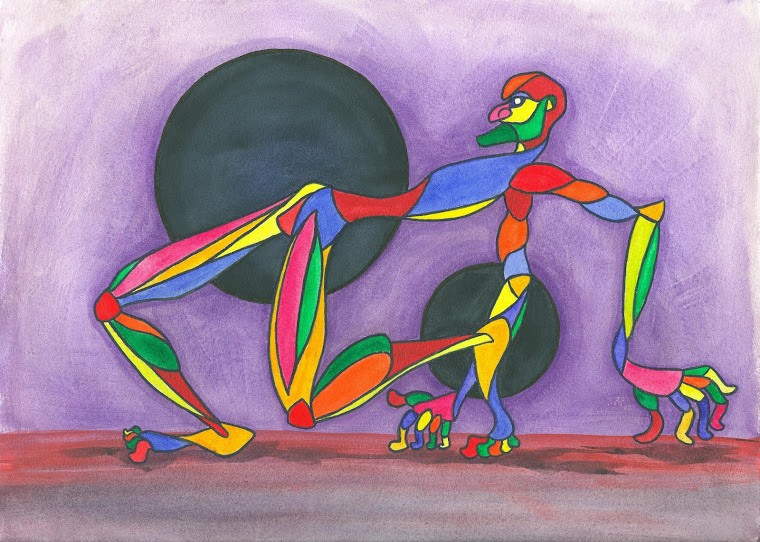
It started with the stories—people saying I was “such an artist”. As early as four or five years of age, I remember the tales I would spin for my god-sisters. When one asked why our nearly-identical snow boots were somehow different colors right down to the Velcro (this does seem a mystery at four), I explained that when they grew the boots up at the North Pole they all started out white but changed color based on what they were fed. A diet of strawberries and grapefruit would give you pink boots, whereas tomatoes and cherries made red, celery and lettuce for green, eggplant and grapes for purple, etc. But I had early learned that those sorts of stories set off some special sensor in the grownups, so I kept my tall-tales to the obviously fictional for my parents and their peers. This, of course, led to comments of what a great writer I could be!
Then again, I was drawing long before I could verbalize my rich fantasy life, and, since I kept it off the walls, my parents were very proud of what they saw as my great talent. I was a strictly inside-the-lines sort of colorist. If any of my crayon marks strayed it was because I felt the vegetation around Snow White needed extra flowers—or apples in the trees (an early nod to foreshadowing I have never been able to shake). Instead of any great “talent”, I would attribute my artistic success with a penchant for mimicry and extrapolation. While giving life to Barbie’s Beach Vacation with my grandfather around the age of six, I watched him shade Skipper’s hair, making it almost ripple in the breeze from the Aquamarine water, and I immediately started doing the same, giving sensuous dimension to Ken’s biceps and Barbie’s thighs. I observed my uncle’s handmade cartoon Christmas cards and discovered stippling, crosshatching and other tools of 2D trickery. I was praised for these as if I’d invented them myself.
School brought a sudden concatenation of story and picture, also further praise and the expectations they bring. We were asked to practice our writing on giant sawdust colored pages with blue-ruled lines. The paper was so thin that erasing was not an option. The top half was for illustrating the two or three sentences below. No doubt, the idea was to give our teacher some guess as to the chicken-scratch, the better to edit backward letters, interestingly spelled words and half-finished ideas. (“wә tuk th doɢ. it wusNʇ rainig!”–illustrated by a circus tent and something that looks like a giant hamster.) I took this canvas as my mandate to create something like a page from the children’s books I adored. I put everything I could in to those illustrated assignments. My teachers grandly announced my great future as an artist, an illustrator, a writer. Although I did just as well with math, with our science labs or book reports, I was never declared to be a future Academic (although I now understand that to be one of the longest Four Letter Words in our culture) but was declared Artist Emily. I suppose my academic excellence was viewed as precocious given my apparent avocation.
Eventually I learned to stop trying so hard outside the Art/Write category. No matter the class, it was my creative endeavors that garnered the most éclat. I passed AP American History because of an extra-credit project: a retelling of the movie “Spartacus” as a socialist student-movement during the McCarthy/anti-Communist era (my teacher loved it!). It might have taken me five out of the four weeks of our Advanced Chemistry unit on biological chemistry to memorize and correctly calculate the equation for photosynthesis, but I aced the essay questions!
I understand now that the “praise” I received was based on low expectations and a lack of understanding on the part of most teachers, my parents and my peers (not to mention, myowndamnself). A science teacher expects you to at least try to excel in science. If you also write well, they’ll be impressed. Art and creative writing teachers have been so underwhelmed for so many years that any student that does at all well is a bolt out of the blue—and a ray of hope. Also, the years and years of sub-standard artistic education in American schools have lead to a society with very little understanding of what it means to “be a writer” or “be an artist”—and what idea they have is romanticized by Hollywood. While my cheering section felt they were giving me a yellow-brick road to my rosy future, they were instead filling my head with aspirations that could, at best, lead to a futuristic version of Great Expectation, only less optimistic. So, instead of anyone correctly informing me that I was nearly equally talented in everything I attempted (and exceptional in none), I was sent out in to the Great Wide World with a bit of a sense that I was special and that, should that not prove true, I should at least try to be.

